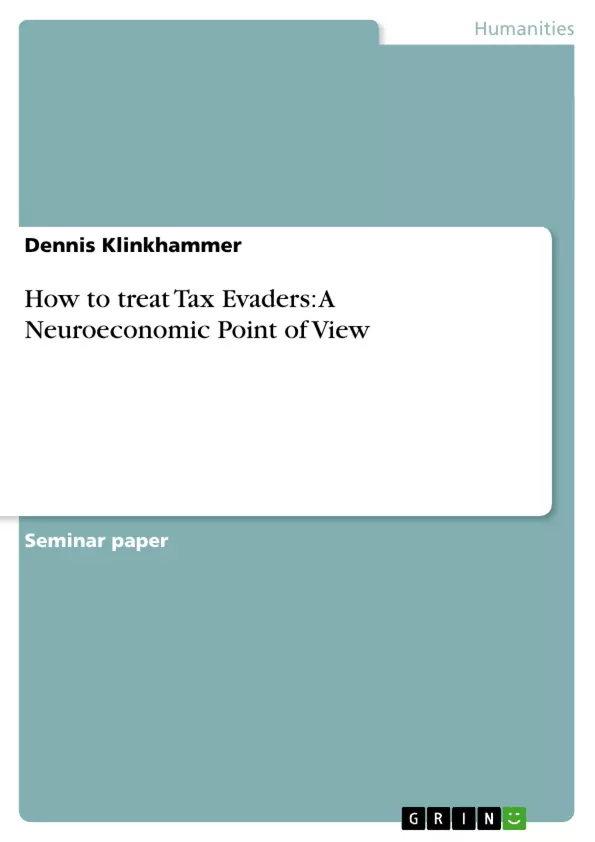What kind of inner progress urges the tax evader to pay his tax: Is it the sovereign thought about the consequences, the late conviction that paying taxes is honest or is it more than thinking and feeling – perhaps it is an unavoidable reaction on that external tax collecting factor, determined by the tax payer's genes?
This research paper is a view inside the taxpaying individual itself: In case of taxation an internal motivation to cooperate exists and it is influenced by the level of neurotransmitters.
Inhaltsverzeichnis (Table of Contents)
- Introduction: Sovereign tax behavior?
- Development of tax collecting methods and their effects
- Taxpaying as a social dilemma
- Empirical evidence for the relationship between sanctions and trust
- The relevance of trust for taxpaying
- Taxpaying: A neural determined matter?
- What our brain thinks about taxes
- Neuronal determination of financial risks
- Summary
Zielsetzung und Themenschwerpunkte (Objectives and Key Themes)
This paper aims to combine psychological research on the effects of sanctions and amnesties with neuroeconomic research and its potential implications for taxpaying behavior. By delving into the internal motivations and neural processes that influence individual taxpaying decisions, the paper provides a unique perspective on the complexities of tax evasion and the role of internal factors in shaping individual tax behavior.
- The effects of sanctions and amnesties on taxpaying behavior
- The role of trust in taxpaying decisions
- The impact of social dilemmas on tax compliance
- The neural determination of financial risks and tax-related decisions
- The potential for neuroeconomics to inform tax policy and interventions
Zusammenfassung der Kapitel (Chapter Summaries)
The first chapter introduces the concept of “sovereign tax behavior” and highlights the challenges of understanding and addressing tax evasion. It emphasizes the importance of considering the internal motivations of tax evaders and the potential role of neural factors in influencing their decisions.
Chapter two explores the development of tax collecting methods, focusing on the contrasting approaches of sanctioning and persuasion. It examines the theories underlying these approaches and analyzes the impact of sanctions on individual taxpaying decisions. The chapter also discusses the role of procedural justice and the importance of trust in fostering tax compliance.
Chapter 2.1 further elaborates on the concept of taxpaying as a social dilemma, highlighting the conflict between personal and collective interests. It explores the "free rider" problem and the potential effects of sanctions on trust levels within a taxpaying context.
Chapter three delves into the neural basis of taxpaying decisions, examining how brain processes influence individual financial risk assessments and tax-related choices. The chapter explores the potential for neuroeconomic research to provide insights into the underlying mechanisms of tax behavior and inform tax policy.
Schlüsselwörter (Keywords)
Tax evasion, tax compliance, sanctions, amnesties, trust, social dilemmas, neuroeconomics, neural determination, financial risks, tax policy.
Frequently Asked Questions
What is the neuroeconomic perspective on tax evasion?
It investigates how internal biological factors, such as neurotransmitters and brain processes, influence an individual's motivation to cooperate and pay taxes.
How does trust affect tax compliance?
Trust is a critical factor; research shows that high levels of trust in the system increase voluntary taxpaying, while sanctions can sometimes undermine this trust.
Why is taxpaying considered a social dilemma?
It involves a conflict between personal interest (keeping one's money) and collective interest (funding public goods), leading to the "free rider" problem.
What role do sanctions and amnesties play in tax behavior?
The paper explores how external factors like the threat of punishment or the offer of amnesty interact with internal psychological and neural motivations.
Can neuroeconomics inform tax policy?
Yes, by understanding the neural determination of financial risks, policymakers can design interventions that better align with how the human brain processes tax-related decisions.
- Arbeit zitieren
- Dennis Klinkhammer (Autor:in), 2008, How to treat Tax Evaders: A Neuroeconomic Point of View, München, GRIN Verlag, https://www.grin.com/document/126030



